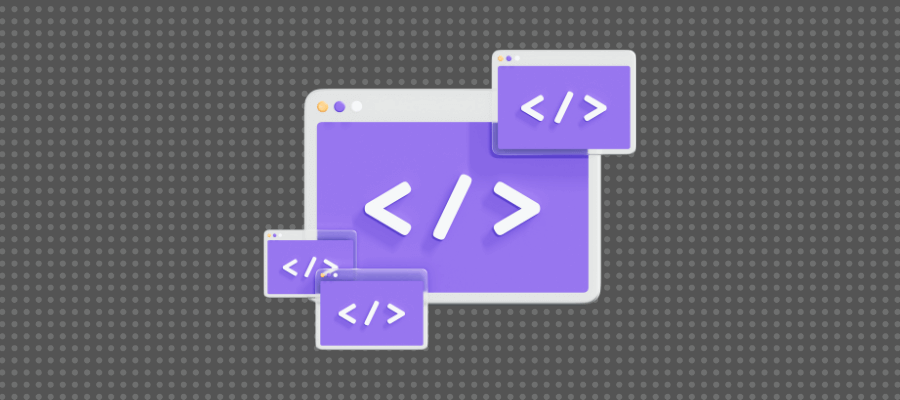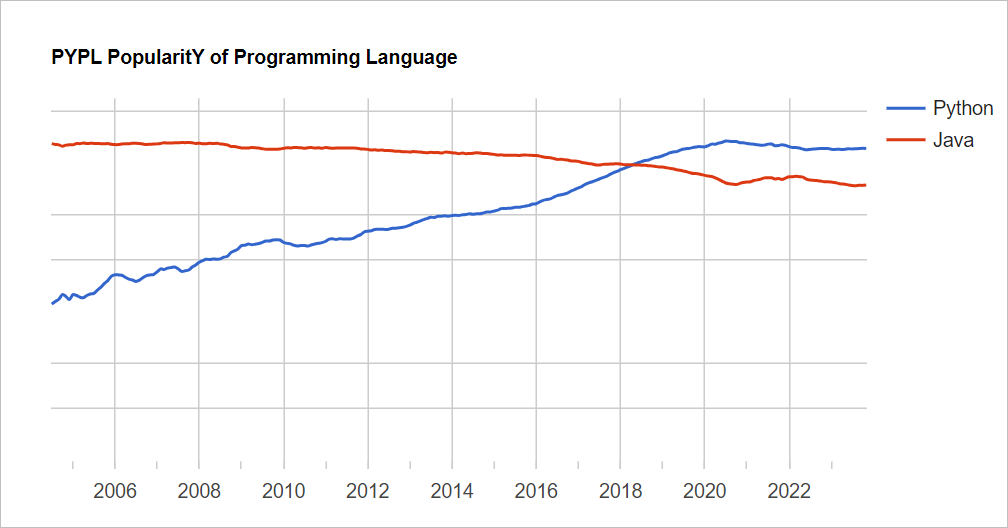As an AI developer, I understand why the Python programming language is important to grow in the tech field.
Whether you want to develop websites, scrap data, build automation, or analyze and visualize a large database, you need to learn Python.
However, as a beginner, you might not have a clear idea about Python career paths, job opportunities, roles, and skills.
This is why I have created this giant guide covering the possible Python career progression paths along with their salary and required skills.
And, I have added my favourite resources for you to learn different Python skills in 2024.
Python career paths at a glance
Is Python a good career path in 2024?
Yes, Python is a good career choice in 2024 because of its high demand, job opportunities, good salaries and job security.
Below, I have explained each with valid data and statistics.
1. Increasing Popularity of Python programming languages
Python has become one of the most popular programming languages in the world today and learning this can open so many career opportunities.
The below graph from Google Trends Data displays how Python has been steadily gaining popularity and also surpassing Java, the legacy language.
As of November 2023, Python is the most popular programming language based on the number of tutorials searched online. This information can help you choose which programming language to upskill in and use for your next project.
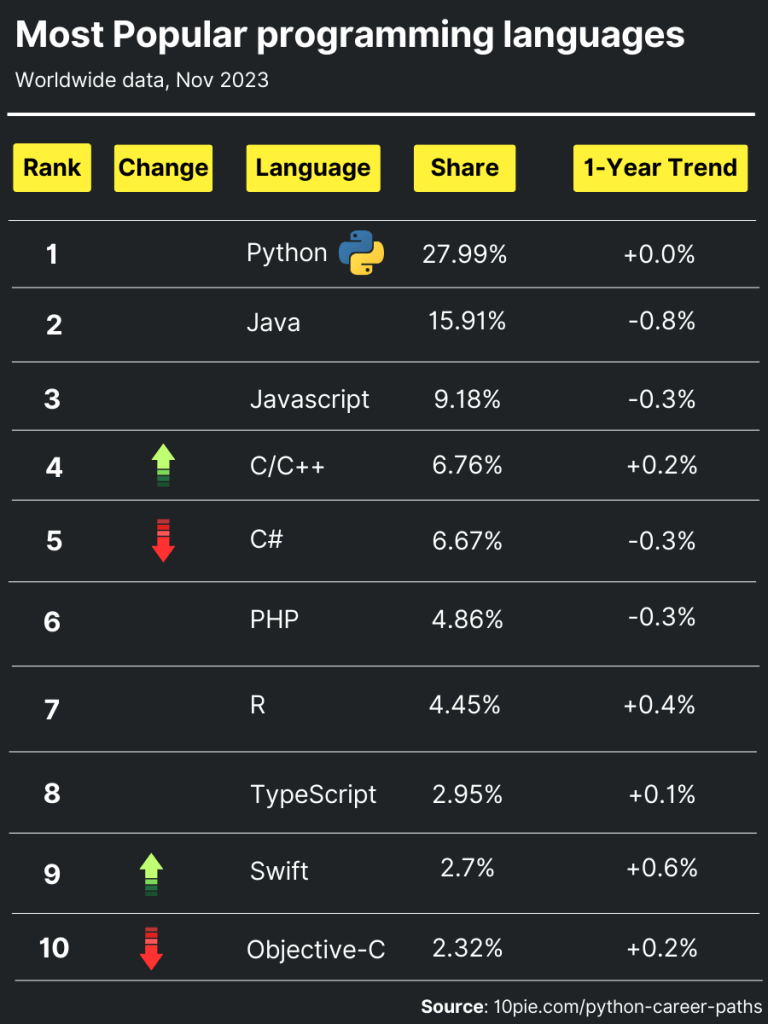
Google Trends shows that Python has become more popular than Java in the past year. This means that more people are searching for information about Python online than Java.

It will never go obsolete and the demand for Python developers will always exist and will continue growing in the future.
2. High salary scope for Python developers
The average annual salary of an AI developer in the USA is between $92,229 to $110,101.
Below is the average salary of a Python developer in different cities in the US.
The highest being $140,000 in New York and Massachusetts and the lowest is $85,000 in Nebraska.
| State | Average Python Developer Salary |
| Massachusetts | $140,000 |
| New York | $140,000 |
| California | $137,817 |
| Illinois | $130,000 |
| Virginia | $120,450 |
| Michigan | $92,500 |
| Alabama | $90,000 |
| Ohio | $90,000 |
| Indiana | $87,750 |
| Nebraska | $85,000 |
| Salary data source | |
The average annual salary of a Python developer in India is ₹5,50,000.
As the popularity of Python is growing worldwide, the demand will increase and proportionally the salaries will increase.
| Country | Average Salary |
| The UK | $55,190 |
| Germany | $58,932 |
| Belgium | $45,065 |
| Switzerland | $192,639 |
| The Netherlands | $49,520 |
| Denmark | $76,526 |
Python developers are in high demand worldwide, and this is reflected in their salaries. As you can see from the tables above, Python developers in both the US and India can expect to earn high salaries.
3. Python jobs availability
To understand whether there are enough active jobs available for Python developers, I searched through various job boards such as Indeed, Glassdoor, LinkedIn, etc.
When I looked for Python developer jobs on LinkedIn, I saw over 12,900 job postings in India alone.
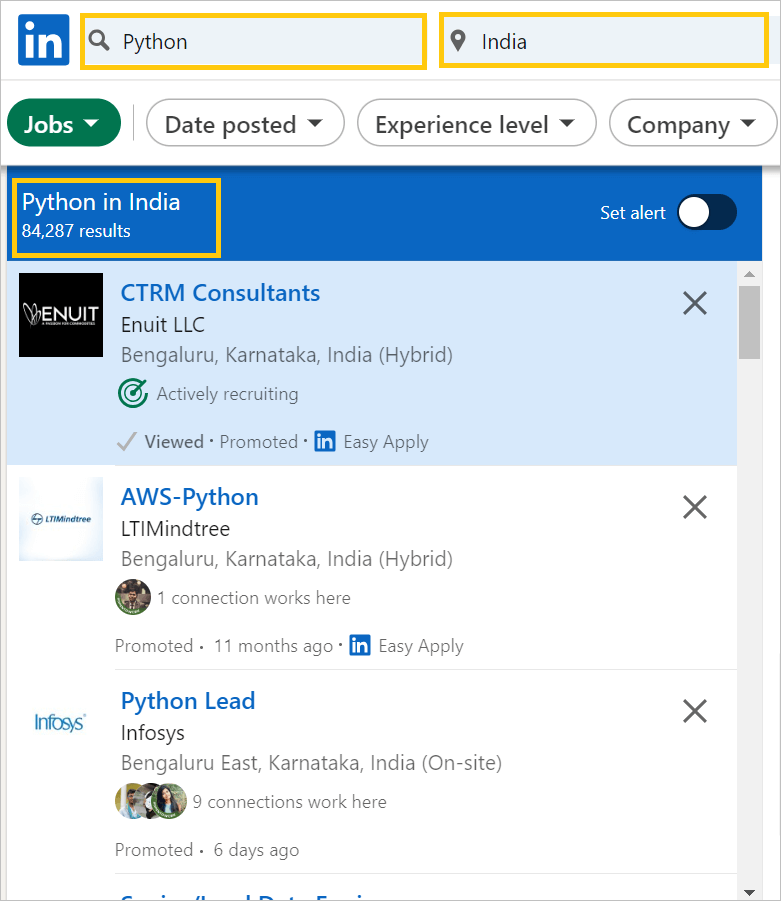
Not only on LinkedIn, but Glassdoor also has more than 21,000 active Python jobs available across India.
Here’s the screenshot:
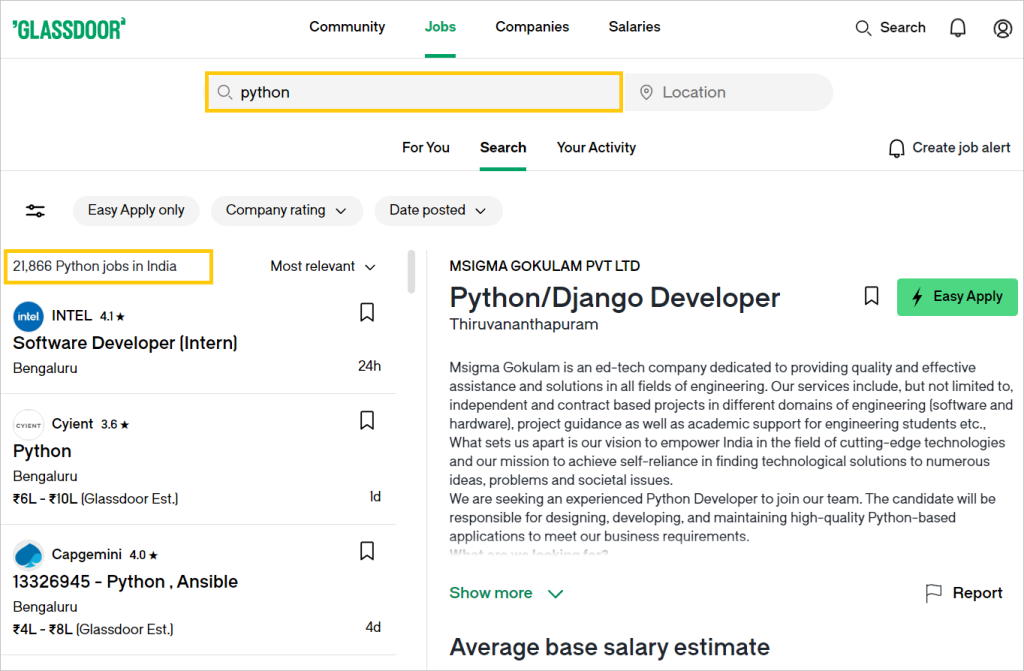
If you are a Python developer, you can be confident that there is a strong demand for your skills. With so many active Python jobs available, you are sure to find the right opportunity to use your skills and make a difference.
What do Python developers do?
Python is a scripting language used in developing software, often relying on libraries and frameworks. For example, Django for web development, Numpy/Pandas for machine learning, etc.
Python is a versatile language that can be used in a wide range of tasks, making it a popular choice for developers of all levels of experience.
Day-to-day responsibilities of Python developers:
- Efficient Coding: Write reusable and scalable code.
- Involved in the Software Development Life Cycle (SDLC), including requirements tracking, analysis, design, development, testing, and user acceptance testing.
- Backend Development: components like server-side logic, statistical learning models, and highly responsive web applications.
- Code Review and Documentation: Check other developers’ code and contribute to technical documentation for reference and reporting.
- Collaboration with front-end developers: Improve user interfaces and integrate APIs.
- Version Control and Deployment: Utilize tools like GitHub and Bitbucket to manage code versioning. Also responsible for deployment to staging and production servers.
- AI and ML Model Creation: Develop predictive models for AI and ML-based features, working with Python libraries like Pandas, NumPy, etc.
- Automation Scripting: Develop automation scripts using Python.
- Client Interaction: for change requests, trouble reports, and requirements collection.
- Responsible for debugging and troubleshooting programming-related issues.
Python Career Paths in 2024
The field of Python offers a range of career opportunities that are continuing to expand.
Here are some common job roles you can explore:
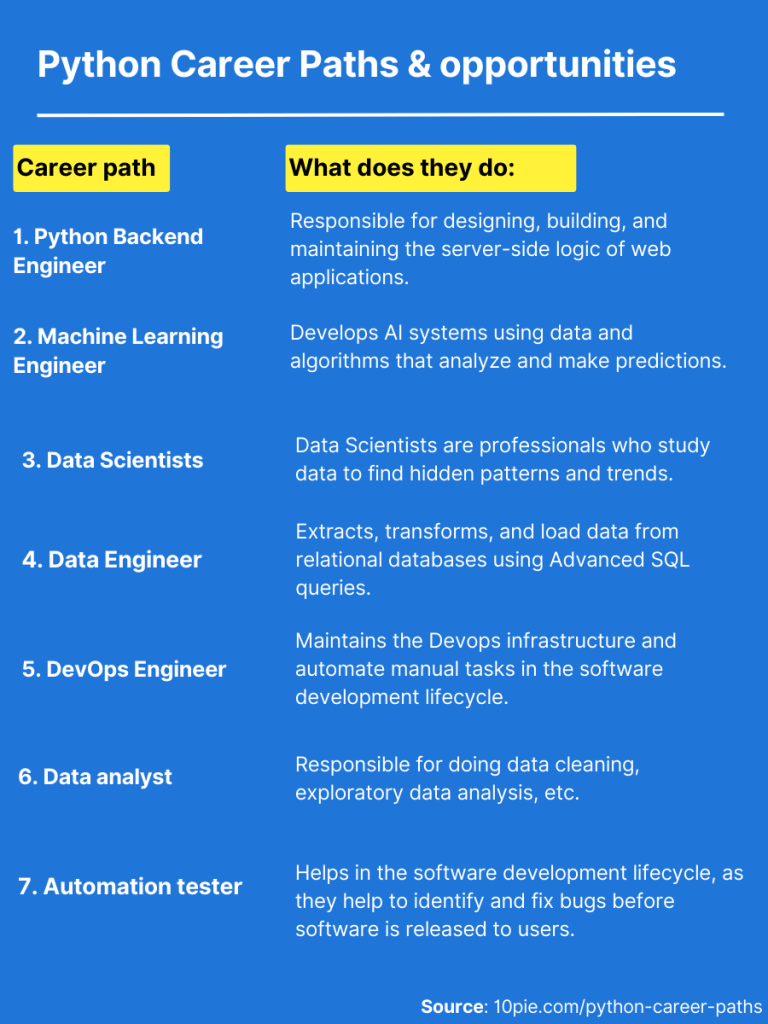
1. Python Backend Engineer
Python backend developers are responsible for designing, building, and maintaining the server-side logic of web applications.
They closely work with front-end developers to ensure that the user interface and the application logic work together seamlessly.
They also work with DevOps engineers to deploy and maintain the applications in production.
Years of experience required: 2-5 years
Role type: Mid Level
Average annual salary: INR ₹9,05,199 in India, $140,335 in the US.
Job responsibilities:
- Write effective and scalable code
- Test and debug programs
- Develop back-end components to improve responsiveness, receptiveness, and overall performance
- Integrating front-end elements using server-side logic
- Integrating data storage solutions
Key skills required:
- Work experience as a Python developer
- Proficient in at least one popular Python framework, such as Django, Flask, or Pyramid.
- Knowledge of multi-process architectures and the threading limitations of Python.
- Experience with server-side templating languages such as Jinja 2 and Mako
- Database knowledge in PostgreSQL, MySQL, relational databases, etc.
Free learning resources:
- Web Programming with Python and JavaScript by Harvard University – It covers Flask and Django (python backend frameworks), and SQLAlchemy (python ORM).
- The Flask Mega-Tutorial
2. Machine Learning Engineer
Machine Learning engineers are skilled programmers who develop artificial intelligence systems using data and algorithms that analyze and make predictions.
Years of experience required: 1-3 years
Role type: Entry Level
Average annual salary: INR 8,80,000 in India, $140,202 in the US.
Job Responsibilities:
- Research and implement appropriate ML algorithms.
- Perform statistical analysis and fine-tuning the model.
- Construct complete ML pipelines, including stages like data pre-processing, model training, model deployment, cross-validation, and active feedback.
- Deploy machine learning models on cloud computing platforms, such as Amazon Web Services (AWS), Google Cloud Platform (GCP), or Microsoft Azure, to achieve scalability and cost-effectiveness.
Key skills required:
- Programming: Strong proficiency in Python, with experience in other relevant languages like R or Java
- Machine Learning Frameworks: Tensorflow, PyTorch, scikit-learn, and Keras.
- Cloud computing platforms: AWS, Azure, or GCP for scalable deployment.
- Data Analysis and Manipulation: Working experience with libraries such as NumPy, Pandas, Matplotlib, Seaborn, and scikit-learn.
Learning resources:
- Courses – DeepLearning.AI – Finish all five to get basic idea about it
- A complete guide to start and improve in machine learning (ML)
3. Data Scientists
Data Scientists are professionals who study data to find hidden patterns and trends.
Years of Experience: 2-5
Role Type: Mid Level
Average annual salary: INR 12,70,000 in India, $1,35,530 in the US.
Job Responsibilities:
- Perform exploratory data analysis using Python modules.
- Build and deploy machine learning models.
- Implement CI/CD pipelines and automate model deployment and scaling processes.
- Build and manage pipelines using tools such as Docker, Kubernetes, and Git
- Monitor and improve the performance of AI models
- Lead other developers
Key skills required:
- Programming languages: Python or R.
- Strong foundation of mathematics: probability, statistics, linear algebra and calculus.
- Statistical and machine learning algorithms.
- Data analysis: Python modules like NumPy, Pandas, and scikit-learn
- NLP techniques and frameworks: BERT, GPT, or Transformer models
- Data Mining tools: RapidMiner, KNIME, etc
- Python frameworks: Tensorflow, PyTorch, Keras.
- Cloud Computing Platforms: AWS, Azure, or GCP.
Learning resource:
- The Data Scientist’s Toolbox – Moad HANI
- GitHub – DataScience Resource Guide
- Data science career paths
- Data Science Prerequisites: Skills, Roles & Responsibilities
4. Data Engineer
Data engineers are experts who make sure that the right amount of data is collected, they set up data pipelines, and build data warehouses that store high-quality data for data analysts and scientists to use for analytics and machine learning.
Years of Experience: 1-3
Role Type: Entry Level
Average annual salary: INR 9,80,000 in India, $1,24,771 in the US.
Job Responsibilities:
- Manage raw data to build data architecture and pipelines.
- Design, develop, and maintain data warehouses and marts.
- Improve and manage the data quality.
- Extract, transform, and load data from relational databases using Advanced SQL queries.
- Build dataflow channels and processing systems to handle real-time data streams.
- Monitor and track the performance of the data systems.
Key skills required:
- Programming languages: Python or Scala
- Tools: Apache Airflow or Apache Spark
- Databases: MySQL or PostgreSQL
- Cloud: Google Big Query, Amazon Redshift, Snowflake, StreamSets, etc
- Data Analysis: Python libraries like NumPy, Pandas
- Knowledge of general software engineering and Data infrastructure Skills
- Experience with building ETL pipelines
Resources:
5. DevOps Engineer
DevOps engineers maintain the DevOps infrastructure and automate manual tasks in the software development lifecycle. The Engineers fill the gap between development and operations.
Years of Experience: 1-3
Role Type: Entry Level
Average annual salary: INR 7,60,000 in India, $1,22,781 in the US.
Job Responsibilities:
- Develop and maintain applications by applying software engineering principles.
- Create reusable libraries and application programming interfaces (APIs)
- Develop software that can be automated for the build, test, and deployment processes
- Write unit and integration tests in automated test environments.
Key skills required:
- Programming languages: Python, Ruby, or Javascript.
- Knowledge in software engineering and software design.
- Hands-on experience with DevOps CICD tools such as Jenkins, GIT, and GitLab
- Cloud Platforms: AWS, Microsoft Azure, or GCP.
Resources: DevOps Career Paths and Job Outlook
6. Data analyst
Data analysts are responsible for doing data cleaning, exploratory data analysis, etc.
It is a great fit for professionals with good domain knowledge and less coding skills.
Years of Experience: 1-3
Role Type: Entry Level or Fresher
Average annual salary: INR 5,24,486 in India, $1,05,782 in the US.
Job Responsibilities:
- Analyze and interpret complex datasets.
- Provide a data-based solution for business problems with insightful reports and presentations
- Develop live-updating dashboards
- Clean and prepare datasets for modeling
- Build KPIs/metrics using data transformation techniques
Key skills required:
- Programming skills: Python
- Proficient in Databases: MySQL, PostgreSQL
- Experience with BI tools – PowerBI, Tableau, IBM Cognos, etc
- Working knowledge of Data transformation techniques: aggregation, resampling, filtering, etc
- Machine Learning and statistics knowledge
Resources:
- Google Data Analytics Professional Certificate
- Data Analytics Certificate Course with Charlotte Chaze
7. Automation tester
Automation testers play a very important role in the software development lifecycle, as they help to identify and fix bugs before software is released to users.
Years of Experience: Any
Role Type: Entry Level or Fresher
Average annual salary: INR 5,70,000 in India, $97,619 in the US.
Job Responsibilities:
- Develop and maintain automated test scripts for all applications.
- Conduct performance testing, find issues that lower the application performance, and suggest solutions.
- Develop and maintain test plans, test cases, and test data
- Mentor and train junior automation testers
Key skills required:
- Scripting knowledge: Python, Selenium
- Databases: MySQL
- Experience with SDETs (Software Development Engineers in Test)
- Familiarity with pytest and BDD (Behavior-Driven Development)
- Test Automation frameworks: TestNG, Appium, JUnit, and Protractor
- Performance testing tools: JMeter or LoadRunner
- Understanding in Agile, DevOps, and CI/CD (Continuous Integration and Continuous Delivery) development practices to seamlessly integrate testing into the development process.
Resources:
- Test Automation in Python – Chapter 1
- Python Tutorials For Automation Testing | Python For Beginners
- Automate the Boring Stuff with Python
Skills and Prerequisites to be a Python Developer
To become a skilled Python developer, you can create a learning roadmap based on required skills. Below, you will find the key skills to start your journey as a Python developer.
1. Strong Python Fundamentals
Mastering Python fundamentals will improve your problem-solving skills and will help you understand how to break down complex tasks into small steps to write efficient and manageable solutions.
- Object-oriented programming (OOP): classes, objects, inheritance, polymorphism, and encapsulation, to build robust and maintainable code.
- File Handling: Understand how to read, write, and manipulate files to effectively manage data storage and retrieval.
- Exception Handling: Learn to handle errors and exceptions to write stable and reliable code.
- Data Types and Data Structures like lists, tuples, dictionaries, and sets
2. Python Frameworks
Being familiar with the Python frameworks will help in understanding the MVC(Model-View-Controller) architecture and databases with which you can easily design and build scalable and secure web applications.
- Django – high-level python web framework
- Flask – lightweight and flexible microframework, best for college projects with minimum overhead
- Pyramid – used in building complex, industry-level web applications with a lot of customization options and overhead.
3. Version Control Systems
Version Control Systems are important for tracking changes in the codebase, especially when multiple developers are working on a project simultaneously. Here are some examples:
Git is the most popularly used and great to begin with. First, to understand the basic concepts such as commits, branches, and merges. This will lay the groundwork for using VCS tools properly.
Git uses a distributed architecture where every developer has a complete copy of the codebase on their local machine, including its entire history of changes. This helps the developers to work offline and commit their changes to the central repository when they connect
2. Apache Subversion Documentation
Apache Subversion(SVN) is an alternative version with a centralized architecture. This is the same as git but has a centralized repository, which means that the developers working on the project must connect to this repository to get the latest code and commit their changes.
Read more about the differences between GIT and SVN
4. Python libraries
- NumPy – fundamental library for numerical operations and handling large datasets
- Pandas – data analysis library, to manipulate, analyze, and visualize data
- Matplotlib – a plotting library, to create data visualizations, graphs, and charts.
How Difficult is Python?
Python language is considered one of the easiest languages to learn, making it a great choice for beginners. Its syntax is like reading English, so it’s easy to read and understand.
Due to the various advantages, it has a large and active community that actively helps in troubleshooting and providing online resources.
One of the key features is its built-in libraries that provide ready-made tools for certain tasks, so you do not have to to write a function separately from scratch
My personal introduction to Python occurred two years ago when “Python in 30 Days” was the trend. I started learning from this Udemy course using my senior’s credentials.
The structured teaching approach was easy to follow and the hands-on projects helped me understand the working better. I actively asked questions in forums and helped others to my best. This approach made the process of learning enjoyable and I would highly recommend the same to you.
Note: While watching the lectures is useful, actively solving problems is important. So learn the basics and solve problems on websites like Hackerrank, Leetcode, and codewars. It will help you become a skilled programmer.
Future of Python developers – will AI replace Python developers
No, AI will not replace Python developers for the following reasons:
- AI is good at automating tasks and offering suggestions but lacks the creativity or problem-solving skills that are required for full-fledged software development.
It just generates code from the data it is trained on. - AI tools cannot talk to the customer or understand their requirements and build a system from scratch.
- AI models are currently limited to handling smaller, more focused tasks and cannot handle complex and large amounts of code. Only useful for small parts of the entire system.
Although it is transforming the programming scenario, by generating code and finding bugs, it will play the role of a tool that will help the developer rather than completely replace them.
Read more: AI will not take your coding job, but it can make you a better coder
Python certifications to start your career
Further resources on Python learning:
1. The Complete Python Bootcamp From Zero to Hero in Python
Course Fee: INR 700
Duration: 22 hours of video lectures
This course will teach you everything you need to know to become a proficient Python programmer, even if you have no prior coding knowledge.
Along the way, you will also learn how to use Python to solve real-world problems, such as building a simple calculator, creating a web application, and analyzing data.
The course is taught by Jose Portilla who is an experienced Python developer with over 10 years of teaching experience.
2. 100 Days of Code: The Complete Python Pro Bootcamp
Course Fee: INR 700
Duration: 54 hours video lectures
This course is a structured approach to learning Python in 100 days with each day focusing on a specific concept or project. Throughout the course, there are hands-on coding exercises where you apply your knowledge and improve your programming skills. By the end of the course, you will also have projects to add to your resume.
The course is taught by Angela Yu who is a Python instructor and author.
3. PCEP – Certified Entry-Level Python Programmer
Course Fee: $50
Duration: 2-4 weeks
This certification is for beginners who want to learn the basics of Python programming. It covers topics such as syntax, variables, data types, control flow statements, functions, modules, and object-oriented programming.
4. PCAP – Certified Associate in Python Programming
Course Fee: $100
Duration: 4-6 weeks
This certification requires a basic understanding of programming concepts and experience with Python syntax. Specifically for programmers who want to validate their intermediate-level Python skills. It covers topics such as data structures, algorithms, object-oriented programming in Python, file handling, exception handling, and regular expressions.

Tata Sai Nandini is an IT Professional with experience in the Python and Data Science domain. With expertise in Statistical Analysis, Exploratory Data Analysis, Data Visualization, Data Extraction, Data Wrangling, Image Processing, Text Processing, and the creation of Machine Learning and Deep Learning models, she is a versatile and skilled practitioner in the field. Tata Sai Nandini’s skillset encompasses a wide range of tools and technologies, including Python, C++, C, various IDEs, Python libraries, data visualization tools, and machine learning and deep learning frameworks.

